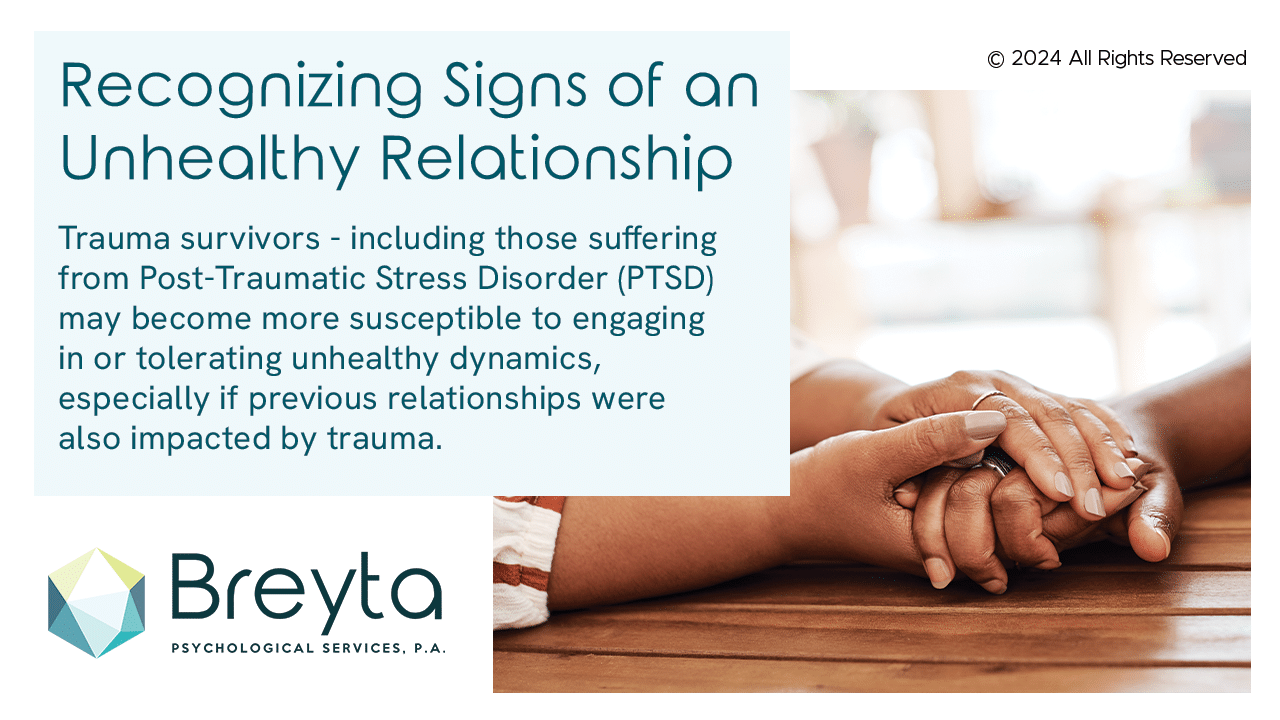Navigating relationships is complex for anyone, but when trauma enters the picture, it can bring unique challenges that make healthy connections feel out of reach. That said, trauma can deeply impact the ways we interact with loved ones, how we handle conflict, and even how we perceive ourselves within relationships.
To shed light on this, Dr. Vanessa H. Roddenberry, Ph.D., HSP-P, founder and Executive Director of Breyta Psychological Services, shares her expertise about how trauma affects relationships and how we can cultivate connections that heal and support our well-being. Dr. Roddenberry’s insights offer hope and guidance for anyone seeking to build healthy, fulfilling relationships despite past trauma.
We can help you find your way forward. Start your journey with Breyta Psychological Services Today.
Understanding Trauma’s Impact on Relationships
Trauma, whether it’s childhood trauma or relational trauma, leaves a lasting imprint on our emotional and psychological health, which inevitably influences our relationships. Dr. Roddenberry notes that trauma can impact us in a few primary areas, especially around trust, emotional regulation, and attachment.
“Trauma affects everybody on an individual level very differently,” Dr. Roddenberry explains, “but there are a few general areas that we know everyone tends to struggle with following trauma… trust, emotional regulation, and attachment.” These fundamental areas form the basis of how we connect with others. When a traumatic experience affects them, it can ripple through every close relationship in our lives. This can even result in trauma bonding, where an unhealthy attachment can form with an abusive partner.
One major challenge for a trauma survivor is regulating emotions. Dr. Roddenberry describes emotional regulation as “our ability to sit with difficult emotion, figure out how to process it, and even come out the other side of it effectively.” However, if trauma leaves us feeling overwhelmed, it can lead to avoidance, making it difficult to connect with loved ones. “If you’re feeling very avoidant of your own emotions, it’s going to be hard to have conversations about important topics with your partner,” she says.
This pattern of avoidance can lead to isolation, even in relationships that were once sources of comfort and connection.
Complex trauma can also affect trust in relationships, both in terms of trusting ourselves and trusting others. “The trust we have in our own ability to perceive a situation accurately, our trust in our own emotions, and our perceived trust of others can all be shaken after trauma,” Dr. Roddenberry notes. This erosion of trust can make it difficult to open up, communicate needs, and believe in the stability of our relationships, which can feel like a loss of safety and intimacy.
Recognizing Signs of an Unhealthy Relationship

Identifying when a relationship is unhealthy can be challenging, especially for individuals who have experienced trauma. Trauma survivors – including those suffering from Post-Traumatic Stress Disorder (PTSD) may become more susceptible to engaging in or tolerating unhealthy dynamics, especially if previous relationships were also impacted by trauma. Dr. Roddenberry outlines several key indicators that may point to an unhealthy relationship.
“If you feel like you’re not allowed to have your needs met… or your opinion is devalued, that’s an area for concern,” says Dr. Roddenberry. In any relationship, there should be mutual respect, trust, and the ability to express needs without fear. One common red flag is emotional manipulation, where a partner might invalidate your experiences or make you feel wrong for expressing your needs. “If you feel like you share your opinion and you’re told that’s patently wrong, that’s an area for concern,” she explains.
Dr. Roddenberry also cautions against controlling behavior, noting that trauma can sometimes drive individuals to exert control in relationships as a way to manage anxiety. “With trauma, we often see over-control related to feelings of anxiety. Over-controlling behaviors can create serious problems in a relationship,” she notes. Recognizing these patterns early and seeking help can make a significant difference in avoiding long-term relational harm.
Healing from Relationship Trauma While Staying Connected
Healing from a traumatic event is possible, even while actively engaged in relationships. This healing process often involves addressing unresolved trauma and learning new, healthier ways to relate to others. At Breyta Psychological Services, Dr. Roddenberry and her team support clients through this complex journey, helping them heal and build connections that are both nurturing and sustainable.
“Healing from past trauma while you’re in the context of a relationship is definitely possible,” she says. “We do this all the time with our clients.” Trauma survivors may worry that their relationships will always be affected by the past, but Dr. Roddenberry emphasizes that therapy can help individuals understand and overcome the obstacles trauma may have placed in their way.
Many people are surprised to learn that they can attend individual therapy to work on relationship issues, even without their partner. “You can attend individual therapy to work on your relationship… talking about your relationship, its impact on you, and building skills to improve it,” Dr. Roddenberry notes. In these sessions, clients can process traumatic events in a safe space and develop tools to bring positive changes into their relationships.
Key Qualities of Healthy Relationships
While healing from trauma, understanding the markers of a healthy relationship can provide a guide for what to seek or build with others. According to Dr. Roddenberry, essential qualities in a healthy relationship include communication, mutual respect, emotional support, and healthy boundaries.
“As you learn to increase your emotional awareness and courage, you’re also going to be more willing to open up and communicate,” Dr. Roddenberry explains. Communication allows both partners to express needs, resolve conflicts, and grow together, making it one of the cornerstones of a healthy connection. Emotional intimacy is another key factor, as it allows for vulnerability, trust, and mutual validation.
Boundary setting is also vital, especially for trauma survivors and those emerging from abusive relationships. “It’s okay to recognize that if someone isn’t able to meet you where you need, it’s okay to step back from that relationship,” Dr. Roddenberry advises. Setting boundaries is about valuing your own well-being and building relationships that respect those boundaries.
How Therapy at Breyta Supports Relationship Health
Breyta Psychological Services emphasizes a trauma-informed approach to therapy, which means that each client is treated as a unique individual with their own story, background, and needs. The therapists at Breyta work collaboratively with clients to identify and address trauma-related issues that may be affecting their relationships.
“Within the idea of trauma-informed care is acknowledging that you matter as an individual,” Dr. Roddenberry explains. Breyta’s approach centers on building emotional intelligence, compassion, and a tailored plan for each person, considering the larger context of their life and relationships. This holistic and personalized approach helps clients build healthier relationship patterns and connect on a deeper level with the people in their lives.
For example, Breyta’s mental health professionals teach skills like emotional validation and active listening, which can promote deeper empathy and understanding between partners. “Through fostering emotional intelligence, courage, curiosity, and empathy, we help you feel equipped to deal with everything going on internally,” says Dr. Roddenberry.
Breyta’s trauma-informed framework also provides education on how trauma impacts the nervous system, helping both partners in a relationship understand and navigate triggers or heightened emotions and move closer toward trauma recovery.
Another area of focus is co-regulation, which refers to the ability of partners to help each other manage intense emotions. “We teach couples how to recognize over-activation in someone they’re in a relationship with and how to be calming or comforting to them,” explains Dr. Roddenberry. By learning co-regulation skills, couples can build stronger connections and become more resilient when challenges arise.
Trauma-informed Therapy at Breyta Psychological Services
Healing from trauma is a journey that extends beyond individual experiences and affects all aspects of life, including relationships. Through therapy and compassionate support, it’s possible to build healthy, meaningful connections that reinforce personal growth and resilience. Trauma-informed care, like that offered by Dr. Roddenberry and her team at Breyta Psychological Services, empowers individuals to understand and heal their past, creating the foundation for stronger, healthier relationships.
Dr. Roddenberry’s approach emphasizes the importance of emotional courage, compassion, and empathy, allowing clients to not only face their trauma but to embrace the possibility of deep, nurturing relationships. Healing is within reach, and by seeking support, you can transform your relationships and build connections that truly support your well-being.
Start your healing journey. Get in touch with Breyta Psychological Services Today.





